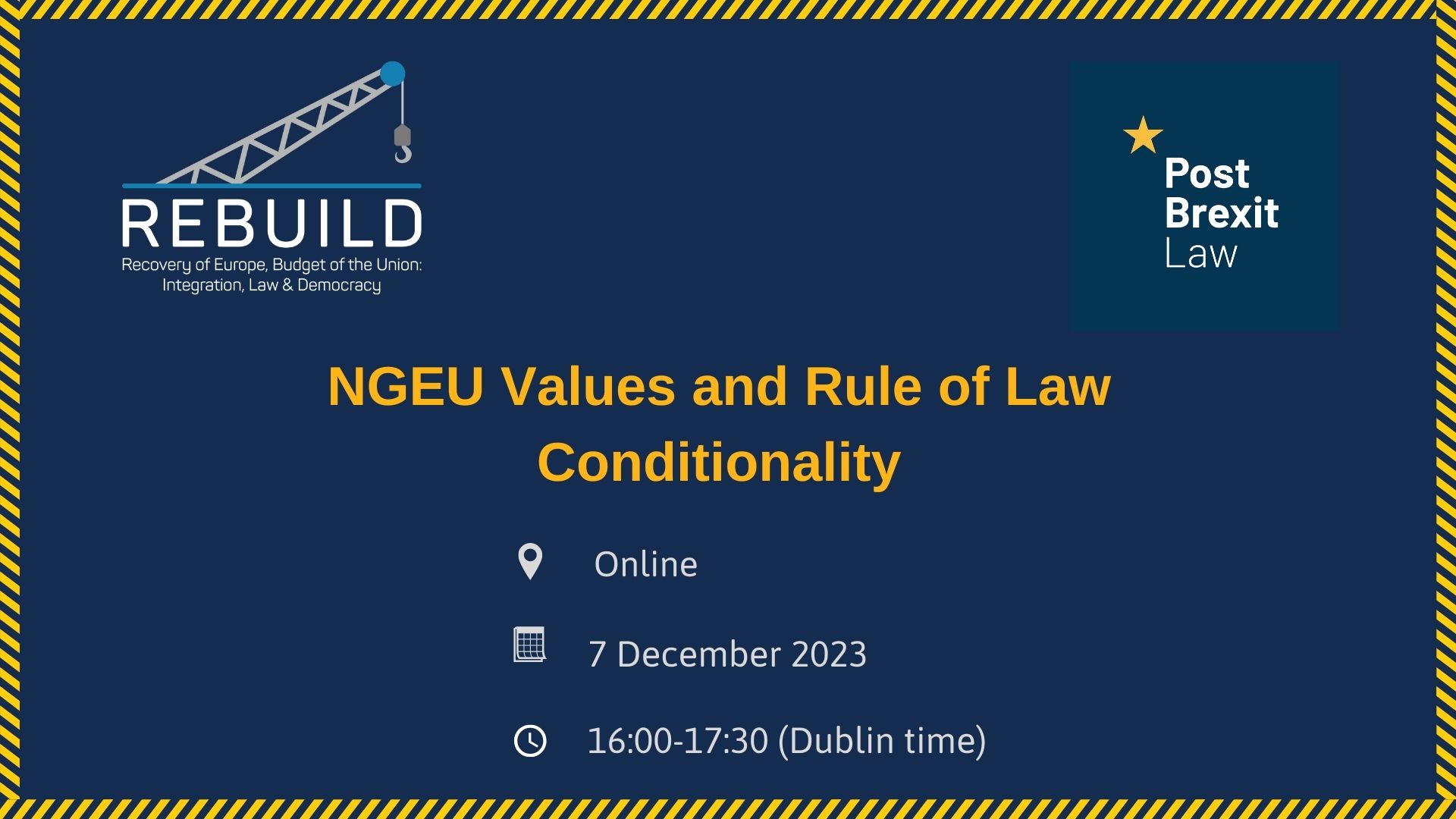Elettra Bargellini (Dublin City University)
On Thursday, 7th December 2023, the Jean Monnet Centre of Excellence REBUILD, in collaboration with the Jean Monnet Module PostBrexitLaw, hosted an online event on the “NGEU Values and Rule of Law Conditionality”.
The event focused on the pivotal and timely subjects of the Next Generation EU Fund, the Rule of Law Conditionality Regulation, and the European Union’s approach to addressing rule of law backsliding in its Member States.
Niels Kirst (Dublin City University), who moderated the event, underscored how the COVID pandemic has prompted the introduction and amendment of EU’s legal instruments, now instrumental in implementing financial conditionality. He said that Poland and Hungary, the two principal EU countries facing rule of law problems, are potentially under the scrutiny of three distinct mechanisms: the Rule of Law Conditionality Regulation, the Next Generation EU funds, and the Common Provisions Regulation.
The first speaker, Daniel Kelemen (Georgetown University), emphasized that over the past decade, the European Union has experienced a systematic democratic backsliding among its Member States, initially manifesting in Hungary, then in Poland, and extending to other Member and candidate states. He observed that EU leaders often attributed the EU’s inaction to a lack of adequate tools. He highlighted four factors that led the European Commission to activate the rule of law conditionality against Hungary in April 2022. These factors include Hungary’s Fidesz party being expelled from the European People’s Party, the departure of Angela Merkel and the formation of a new German government, Hungary’s increasingly antagonistic policies such as anti-LGBTQ legislation, and its pro-Russia stance during the Ukraine crisis. Similarly, the Commission offered conditional financial support to Poland during the Ukraine crisis, contingent on the Polish government’s compliance with ECHR and ECJ rulings. Poland’s non-compliance prompted the Commission to consider actions similar to those taken against Hungary.
Subsequently, Beatrice Monciunskaite (Dublin City University) began her discourse by noting that the Baltic states, while stable democracies, face challenges such as democratic hollowness and backsliding. She highlighted issues in recognizing minority rights, especially the rights of the LGBTQ community and the Roma community. These challenges, although different from those in Poland and Hungary, still show democratic pathologies. However, she pointed out two factors that particularly influenced the Baltics’ alignment with EU values. First, their proximity to Russia, noting that following the path of Poland and Hungary would leave the Baltic states geopolitically vulnerable, as they rely heavily on support from the EU and NATO. Second, she emphasized that the Baltic states are among the largest net recipients of EU funds. Concluding, she stated that the EU’s rule of law conditionality serves as a deterrent against rule of law backsliding. However, she warned of the risk of creating a hierarchy within Article 2 values, with the rule of law potentially overshadowing other rights like minority and human rights, leading to their further neglect in the Baltic states, and in the Central Eastern European area more generally.
John Morijn (Princeton University) analysed the complexities of the European Union’s conditionality regimes in his speech. He said that these mechanisms are intricate due to the existence of multiple regimes, each with its own set of procedures. He particularly focused on the role of the European Parliament, the institution with the greatest support for using conditionality regimes. However, he also highlighted its limited, mostly passive and informational role. He then provided an overview of three key regimes. The first is the conditionality regime, wherein the European Commission initiates actions and the Council decides on funding allocation or blocking, with the European Parliament playing a minimal role. He also examined the Recovery and Resilience Facility, elaborating on the roles of the Commission and the Council in its approval process. Additionally, he addressed the governance ambiguities present in the Common Provisions Regulation. Concluding his remarks, he emphasized the importance of expanding the role of the European Parliament in these processes. He suggested that the forthcoming evaluation of the Rule of Law Commission could be a suitable opportunity to discuss enhancing the Parliament’s involvement in these matters.
The last speaker was Daniel Hegedüs (German Marshall Fund of the US), who spoke about Hungary’s move to autocratization. In this regard, he mentioned the creation of the Bureau of Sovereignty Protection in Hungarian law, a body with extensive investigative powers to scrutinize civil society, organizations, and independent media. He also highlighted that this Bureau is legally authorized to request support from any state institution, including Hungary’s intelligence community. He said that the Hungarian authority employs the language of the EU discourse in combating disinformation, addressing foreign meddling in elections, and tackling the issue of electoral interference. He argued that this is a strategy to align the building blocks of an authoritarian regime with EU law. Thus, a possible solution to counter Hungary’s tactics could involve suspending its voting rights in the Council of the European Union, which would limit Prime Minister Orban’s ability to use these authoritarian methods as leverage against other EU Member States, thereby protecting EU values.
The views expressed in this blog reflect the position of the author and not necessarily that of the Brexit Institute Blog.



